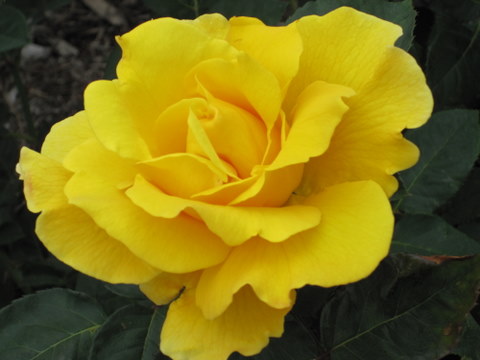“The tree of life is always in bloom if you know how to appreciate it.”
“Wild Roses” by Schubert, created in August 1815, is a masterpiece of vocal music. It is the work of two of the world’s greatest artists and consists of some very lively music. The lyricist was Goethe, the great German poet, and the composer was Schubert, the king of songs. Goethe was twenty-two when he wrote this poem, and Schubert was only eighteen when he composed the music.
Legend has it that this is how it happened:
It was a bitterly cold winter night in Vienna. Eighteen-year-old Schubert was heading home after practicing piano in elementary school.
The night-shrouded street looked slightly deserted. When Schubert was passing by a thrift store, he suddenly saw a little boy he knew. The little boy had studied music with him. Like Schubert, he was a poor boy who had even less money than he did. It was so late at night, and the little boy had not gone home yet. Why was he still standing on the cold street? At this time, Schubert saw that the little boy was holding a book and old clothes in his hands. He immediately understood that the little boy wanted to sell these items, but he hadn’t managed to sell them yet. Schubert also had this kind of experience and when he was a child.
Schubert looked at the little boy with sympathy. He saw the child’s sad eyes fill with tears. The lonely streets, the solemn night, and the bleak, cold wind seemed to engulf them both.
Schubert fumbled inside his pockets and took out all of his money. Unfortunately, there was not very much. His own life was hard enough, as he could not sell much music, and he earned his living by teaching music. Sometimes he did not have enough money to buy paper. He said more than once, “If I had enough money to buy paper, I could compose music every day!”
Schubert shook his head in despair and gave the shield to the boy. “I would like to buy that book,” he said. “I am a teacher.” Then he patted the child on the shoulder.
The child looked at the money in his hand, then at Schubert, and could not speak for a moment. He knew that the book was not worth that much money.
Schubert comforted the child, saying, “Go home quickly. It’s already very late at night.”
The child nodded, turned, and ran away, the cold wind lifting his shirt like a bird flapping its wings. However, after walking a few steps, he turned back to Schubert and shouted, “Thank you, teacher!” As he ran, he kept turning his head and waving to the “teacher.”
Schubert watched until the child’s figure disappeared into the side street where the night mist was rising. Schubert walked home, flipping through the old book as he went. Suddenly, he was attracted by a poem in the book and could not help standing underneath the street lamp to read it──
“Wild Rose:
A boy saw a wild rose
growing in the heather;
it was so young, and as lovely as the morning.
He ran swiftly to look more closely,
looked on it with great joy.
“Wild rose, wild rose, wild rose red,
wild rose in the heather.
Said the boy: I shall pluck you,
wild rose in the heather!
Said the rose: I shall prick you
so that you will always remember me.
And I will not suffer it.”
…..
Ah! This is a very beautiful poem, Schubert thought. He kept on reading…the wind, the night, and his surroundings seemed to disappear, and Schubert saw the wild roses in full bloom. He seemed to smell the rich fragrance of the flowers and saw the figures of naughty children…
A fresh and touching melody came out of the cold night sky. It filled Schubert’s heart and inspired him to run home and write down this beautiful melody.
Sometimes, it is important to stop, appreciate, and capture the unexpected beauty in life.
This text was originally published in Epoch Times 舒伯特的野玫瑰(6/18/2011). I love the article, so I translated it into English so that more of my readers can enjoy it.
Full Translation of the “Wild Rose” by Goethe:
A boy saw a wild rose
growing in the heather;
it was so young, and as lovely as the morning.
He ran swiftly to look more closely,
looked on it with great joy.
Wild rose, wild rose, wild rose red,
wild rose in the heather.
Said the boy: I shall pluck you,
wild rose in the heather!
Said the rose: I shall prick you
so that you will always remember me.
And I will not suffer it.
Wild rose, wild rose, wild rose red,
wild rose in the heather.
And the impetuous boy plucked
the wild rose from the heather;
the rose defended herself and pricked him,
but her cries of pain were to no avail;
she simply had to suffer.
Wild rose, wild rose, wild rose red,
wild rose in the heather.
References:
Van Tuyl Simmons, L. (1919). Goethe’s Lyric Poems in English Translation Prior to 1860. Madison: University of Wisconsin.
舒伯特的野玫瑰:
「生命樹永遠開著花,只要您知道如何去欣賞」
《野玫瑰》,舒伯特作於一八一五年八月,這是一首聲樂曲的傑作,是兩位世界上最偉大的藝術家的結晶。作詞者是德國大詩人歌德,作曲者是歌曲之王舒伯特,歌德寫這首詩時,年方二十二;舒伯特作曲時年僅十八。這是一首曲趣輕快活潑的歌曲。
一個動人的故事
那是在維也納一個寒風刺骨的冬天夜晚,十八歲的舒伯特從小學校裡練完琴正走在寂靜的回家路上。
夜色籠罩的街上顯得有些冷清。當舒伯特路過一家舊貨店的時候,忽然看見一個相識的小男孩。這小男孩跟他學過音樂,和舒伯特一樣,是個窮孩子,甚至比他還要一貧如洗。夜這麼深了,小男孩還沒有回家,仍站在寒冷的街頭幹什麼?這時舒伯特看見了小男孩手裡拿著一本書和一件舊衣服。他立刻明白了,小男孩要賣這兩樣東西,可是站到現在還沒有賣出去。童年的舒伯特也有這樣的經歷和心境,那是一種什麼滋味啊。
舒伯特望著這個小男孩,心裡充滿同情和憐惜。他看見孩子那雙充滿憂鬱、無奈的眼晴裡噙滿淚水。枯寂的街頭、濃重的夜色和淒涼的寒風,似乎要把他們倆人吞沒了。
舒伯特將自己的衣兜掏了個遍,把所有的錢都掏了出來。可惜並沒有多少古爾盾。他自己的生活已經夠清寒的了,作的曲子賣不了多少錢,靠教授音樂謀生。甚至有時連買紙的錢都沒有,他不止一次地說:「如果我有錢買紙,我就可以天天作曲了!」
舒伯特無可奈何地搖搖頭,將那些古爾盾全給了小男孩,他對孩子說:「那本書賣給老師吧!」說罷,拍拍孩子的肩膀。
孩子看了看手中的錢,又望了望舒伯特,一時說不出話來。他知道那本書值不了那麼多古爾盾。
舒伯特安慰孩子說:「快回家吧,夜已經很深了。」
孩子點點頭轉身就跑了,寒風撩起他的衣襟,像小鳥撲扇著快樂的翅膀。可是剛跑出幾步,很快又回過頭沖舒伯特喊道:「謝謝你,老師!」邊跑邊不住地回頭衝著「老師」揮手。l
舒伯特一直望著,直到孩子的身影消失在夜霧漸起的小街深處。他也要回家了,一邊走一邊隨手翻看著那本舊書。忽然,他被書中的一首詩吸住了,情不自禁站在路燈下讀了起來──
少年看見紅玫瑰,
原野上的紅玫瑰,
多麼嬌嫩多麼美;
急急忙忙跑去看,
心中暗自讚美,
玫瑰,玫瑰,原野上的紅玫瑰。
少年說我摘你回去,
原野上的紅玫瑰。
玫瑰說我刺痛你,
使你永遠不忘記,
我決不能答應你!
玫瑰,玫瑰,原野上的紅玫瑰。
……
啊!這是歌德的詩《野玫瑰》。讀著讀著……這寒風、黑夜、周圍的一切似乎都不存在了,展現在舒伯特眼前是那盛開的野玫l瑰。他似乎聞到了那濃郁芬芳的花香,看到了頑皮孩子的身影……
一段清新而動人的旋律,從那寒冷的夜空中飄來,繚繞著舒伯特的心菲,激勵著他飛快地跑回家,把這段美妙的旋律寫了下一來。
也許正是舒伯特那善良的愛心,激發了他心靈深處的靈感,使他捕捉到那美麗的七彩音符,為後人創作了這首一直傳唱至今的歌曲《野玫瑰》。
讓我們有時,停下腳步,欣賞、捕捉美景,意外的靈光突然閃亮!
註: 中文原文來自大紀元( 台灣)2011年06月18日
舒伯特《野玫瑰》




